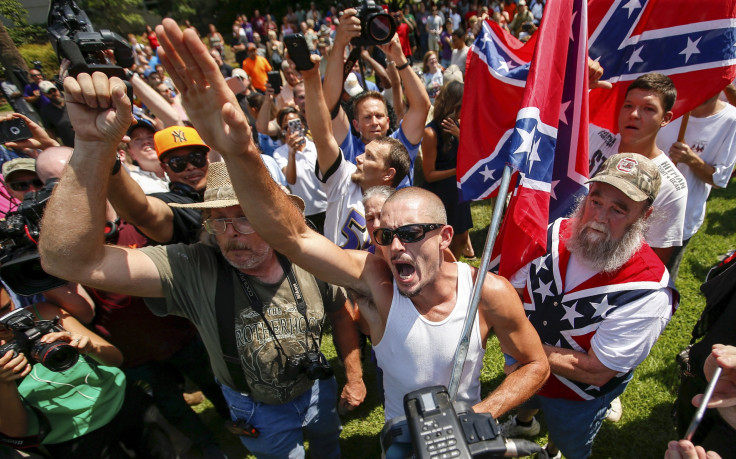US Hate Groups Rise In 2015: Immigration, Black Lives Matter, Confederate Flag Debates Fuel Extremism, Report Finds

The number of hate groups operating in the United States soared in 2015, according to a recently released report from the Southern Poverty Law Center, which monitors extremist activity. Swelling ranks in Ku Klux Klan chapters and black separatist groups largely accounted for a 14 percent rise last year, although anti-gay, anti-immigrant and anti-Muslim groups also saw growth, the Washington Post reported.
“It was a year marked by very high levels of political violence, enormous rage in the electorate and a real significant growth in hate groups,” Mark Potok, author of the report, told the Washington Post.
The report argued that intolerant political speech, particularly from the GOP front-runner Donald Trump, has emboldened extremist right-wing groups. A picture of Trump was featured alongside domestic extremists on the cover of the SPLC magazine's, where the report was published. “Hate in the mainstream had absorbed some of the hate on the fringes,” the report said.
Hate groups rose from 784 groups in 2014 to 892 last year. Texas, California, Florida, Tennessee and Pennsylvania were the top five states for hate groups in 2015.
The year of 'enormous rage': Number of hate groups rose by 14 percent in 2015 https://t.co/vR999F5MI2 from @NirajC
— Sarah Pulliam Bailey (@spulliam) February 17, 2016
The year was marked by racial and political polarization, according to the report. The number of KKK chapters nationwide more than doubled between 2014 and 2015, while black separatist groups rose from 113 in 2014 to 180 in 2015. Such groups have risen in context of debates over the Confederate flag, immigration, police killings of black people, the Black Lives Matter movement and other heated national issues.
Black separatist groups, according to the Southern Poverty Law Center’s website, tend to be “strongly anti-white and anti-Semitic.” The number of such groups soared to their highest in more than half a decade, the report said. They were fueled by "the explosion of anger fostered by highly publicized incidents of police shootings of black men," the monitoring group said.
Some, however, were skeptical of the report’s findings. Critics say the SPLC defines hate groups too broadly, leading to an overestimation of their numbers. At the same time, the group said the numbers were likely an underestimate, as extremists have turned toward the internet, making tracking them all the more difficult.
© Copyright IBTimes 2024. All rights reserved.












